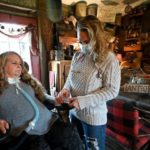New Study of Auto Insurance Reform Documents the Devastation to Catastrophically Injured Crash Survivors
Results released this week by the MPHI continue to show the devastation to auto crash survivors and their families because of changes to Michigan’s auto no-fault (ANF) law that have been in place for about 15 months.
It confirms what the We Can’t Wait Facebook Advocacy Group, with its over 8900 members, have been telling Michigan lawmakers since the bill was passed 2019—survivors are being denied what they paid for and were promised from their auto insurance policies, and it is damaging their health and ruining lives.
Prior to the reform taking effect on July 2, 2021, survivors and families were leading meaningful lives and most lived happily on their own, with their families or in specialized facilities. Care was provided through agencies or family members and therapies were readily available. And survivors received necessary medical equipment, supplies, specialized transportation, and other necessities as prescribed by their physicians.
However, with the reform almost 100 agencies have closed as they cannot absorb the 45% cut in reimbursement mandated by the new law. Others have changed their business model to care for only a few or no ANF patients and are forced to discharge the rest leaving them on their own to find new providers which is almost impossible.
This problem is compounded because in-home paid family care is also cut by 45% and capped at 56- hours. Families are exhausted physically, emotionally, and financially and some have no alternative but to put their loved one in a nursing home which is not staffed, trained, or equipped for the complexities of their injury.
Now many crash victims and families have been forced into a “survival” mode to just keep going. The study found that since July 1, 2021:
- 78% of respondents reported a loss of services
- Over 1/3rd of respondents reported an impact in their rehabilitation progress, increased medical needs, and/or increased behavioral needs
- Nearly 10% of respondents have been hospitalized, directly related to loss of services brought on by no fault reform
- 20% of respondents have applied for Medicaid assistance
- 43% fewer patients are able to maintain full-time employment, as they have no one to get them up, groomed and transported to work, or remain there to toilet them
- 6 deaths reported
The following stories are a glimpse of what many survivors are facing:
Brian Woodward is a quadriplegic man forced from his home because his care givers could not absorb the 45% cut in pay. Brian was in and out of nursing homes and hospitals with infections and sepsis and nearly died. He lost his job of 30 years as a contractor to one of the big 3 auto makers and consequently lost his medical and dental insurance along with his 401K. He can no longer coach little league, attend his church, and sing in the choir or do many things that gave him a good quality of life.
Clarence Golden was injured as a quadriplegic with a spinal cord and traumatic brain injury and required continual two-person (RN/Aide) care (336 hours a week). His sister Chalisse Wilson left her career and was trained to assist in his care. When the agency could not care for him because of the cuts, Chalisse called 63 companies, and none could provide care. Some just hung up when they heard he care was funding by auto insurance. She says the reform disrupted their lives. The Golden/Wilson family have lost their jobs, health insurance, and their credit is being destroyed trying to care for Clarence.
Karl Adams works 24/7 to care for his son. His wife and unborn child were killed, and 2-year-old son was severely injured in an auto crash 20 years ago. Karl was able to manage with the help of ANF but with the reform’s cut in pay and cap on in-home family care, Karl can’t afford to hire anyone to help him. So, Karl tries to do all his son’s care including therapies and rehabilitation and they live mostly off his savings. He says when it runs out, they are in for a world of hurt and enormous stress.
Leslie Rich says with her hours cut to 56 hours a week she can’t pay all the bills and has had to take on two part time jobs on the weekends and still can’t make ends meet. She doesn’t know how much longer they can keep going before they lose their home, and her son ends up in the hospital.
Virginia Robison can no longer afford her house where she cares for her disabled son. She is selling her home so they can move in in with another family member who said “I had no other option than to have a 782 square foot addition built onto my house to prevent my mother and brother from becoming homeless. Now the housing market is beginning to taper off, my mother stands to lose a lot of money. Everyone involved is totally stressed out. She is also working 64 hours a week and only being paid for 56.”
We Can’t Wait is a grassroots Facebook Group of nearly 9000, created for catastrophically injured auto crash survivors, families, providers, and friends to share information and seek advice regarding a fix to PA21-22. Through thousands of letters and emails, phone calls, demonstrations, protests, and visits to the Capitol, We Can’t Wait has become a recognized advocacy group and voice for all crash survivors.




